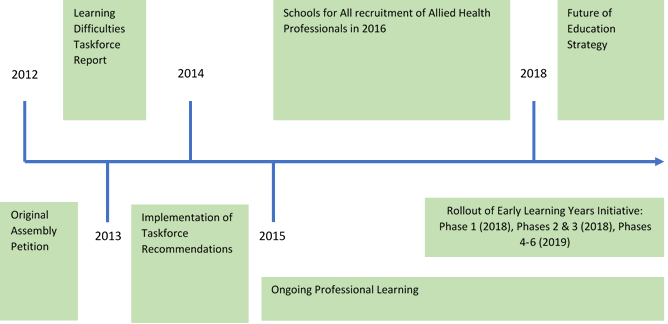Page 2841 - Week 08 - Wednesday, 14 August 2019
Next page . . . . Previous page . . . . Speeches . . . . Contents . . . . Debates(HTML) . . . . PDF . . . . Video
members engaged in the “Inclusion of learners with Speech, Language and Communication needs” course. Training recipients were primarily teachers in mainstream settings, along with a mix of specialist teachers, allied health officers, learning support assistants, school leaders and pre-service teachers.
Following on from the Schools for All program, the ACT Education Directorate continues to demonstrate a strong commitment to literacy outcomes through ongoing professional learning on evidence-based literacy pedagogies available for all teachers and implementation of the Early Years Literacy Initiative (ELYI). This initiative was launched as a pilot with seven schools to focus on developing students’ essential foundational skills in literacy across preschool to year 2 and has been significantly expanded. Across preschool to year 2 the EYLI is currently supporting 51 schools with 50 coaches, reaching 459 teachers, 153 school leaders and 8,568 students. Overall, the EYLI has also provided universal professional learning to 960 teachers in 2018 and 450 teachers in semester 1 2019.
The EYLI, which is continuing in 2019, is playing a critical role in strengthening teachers’ knowledge, understanding and capacity to implement 10 essential instructional literacy practices in the early years. As the Education Directorate moves to implementation of the first phase of the Future of Education Strategy, this work will be complemented by pedagogy and curriculum activities that support increased personalised learning for students. For students with learning difficulties, this will support improved learning outcomes through ensuring objectives, approaches, content and tools are tailored and optimised for each learner.
This response provides a detailed overview of the Directorate’s approach and demonstrates the sustained focus on meeting the needs of students with learning difficulties since the Learning Difficulties Taskforce was established in 2013. Figure 1 captures the key activities since 2012 that support an ongoing focus on meeting the needs of students with learning difficulties.
Figure 1: Timeline of activity

Next page . . . . Previous page . . . . Speeches . . . . Contents . . . . Debates(HTML) . . . . PDF . . . . Video

